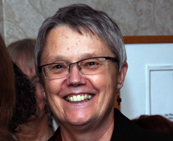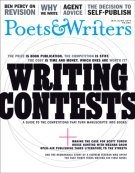INSIDE WOMEN & CHILDREN FIRST WITH ANN CHRISTOPHERSEN
 What were some of your best-selling
books in
2009?
What were some of your best-selling
books in
2009?
Olive Kitteridge by Elizabeth Strout; Her
Fearful Symmetry by Audrey Niffenegger; Yes Means Yes!
Visions of Female Sexual Power and
a World Without Rape,
edited
by Jaclyn
Friedman and Jessica Valenti; Unaccustomed Earth by Jhumpa
Lahiri; The Year of the Flood by Margaret Atwood; The
Sisters
Grimm
Book
1: Fairy-Tale Detectives by Michael Buckley; In
Defense of Food by Michael Pollan; Fun
Home by
Alison Bechdel; Hardball by Sara Paretsky; The Mysterious
Benedict Society by Trenton Lee Stewart; Everywhere
Babies by
Susan Meyers; Hunger Games by Suzanne Collins; Mama Voted For
Obama! by Jeremy Zilber; The Brief Wondrous Life of
Oscar Wao
by Junot Díaz; and The Girl With the Dragon Tattoo by Stieg
Larsson.
What is the best-selling section in
your
store?
Paperback fiction.
What do you look for in terms of an
author
event?
First we consider whether the book fits
with our
specialty—books by and about women—or ones that offer a feminist
perspective
on any subject. It is also important to us that we can provide an
audience for
the author. Finally, though we always want to host women writers with a
national reputation, we are strongly invested in supporting local
writers and
those launching their careers with debut novels, poetry, or nonfiction.
In what ways have your events
changed over the
years?
In the store's early days, many of our
events
were feminist issue–based, sometimes with an author or book involved but
not necessarily. We were a hub of feminist and lesbian politics and
culture,
and produced feminist plays and women's music concerts, sponsored
women's
sports teams, and provided support for almost every women's/lesbian
project in
our city. Over the past number of years, however, we have focused our
energies
and events on books and other written material, knowing that that was
our
unique role in the women's movement.
What challenges do
women still
face that you hope your store can help address?
Women writers are still
vastly
under-represented in review vehicles, which means their books are less
visible.
This can be verified by keeping a gender tally of writers reviewed in
the NYTBR or the New
Yorker, for example, during any
given month. Though women
artists working in most mediums have certainly moved forward, they still
struggle for opportunity and recognition. Women in general have also,
obviously, made many advances since the seventies, but we still have a
long way
to go. Women's right to control our own bodies is constantly being
challenged;
we are still paid less for doing the same job as men; we still have few
good
options for childcare; married women who work—which is the majority of
us—still do more than our fair share of taking care of home and
children;
women are seriously unrepresented in political decision-making. I could
go on,
but these are some of the reasons we still need organizations—and
bookstores—that focus on women.
How does feminism in
the
twenty-first century differ from when you opened this store?
The main difference is
that the
second wave of the feminist movement in the seventies was just hitting
the
streets and was brilliantly, feverishly, and obviously active. New
organizations were being created every day to deal with issues like
incest,
domestic abuse, healthcare, job opportunities, equal pay, the absence of
political power, and many others. The work that began then has become
institutionalized over the years since. It continues to advance, but
people
don't always notice it now since it's become deeper, more complex, and,
some
might say, mainstream. Another significant difference is that many of
the
growing pains have been outgrown: Feminism has been able to overcome
many of
the challenges posed by race, class, and national boundaries, becoming
truly
global.
What role does technology play in
your store?
It has played an important role since
we bought a
computer and began using POS/IM bookstore software in 1985. We had a Web
site
for marketing purposes and then took advantage of the American
Booksellers
Association's Web solution so we could sell books online; we switched
from
print to e-newsletters several years ago; we use social media, first
MySpace
and now Facebook and Twitter. And we have the technology—and desire—to
sell
e-books.
How do you think the rise of digital
reading
devices will affect your future?
The extent to which e-books affect our
future
depends on how large that segment of the market grows and whether there
are any
real opportunities for stores our size to get a share of online sales.
There's
little to no local advantage online, and when your competitors are large
enough
to dictate market prices, it is somewhere between extremely difficult
and
utterly impossible to get even market share to scale.
Where would you like to see Women
&
Children First in ten years?
I would like to see us still finding
ways to serve
our community and fulfill our mission of giving voice to women.
How about feminism?
Continuing to make steady
progress toward
a world in which women are free to live an unobstructed, rich, creative
life.
What do you most love
about
bookselling?
Going through my days surrounded
by books
and the people involved in writing, publishing, selling, reading, and
talking
about them.
Jeremiah Chamberlin teaches writing at the University of Michigan in Ann Arbor. He is also the associate editor of the online journal Fiction Writers Review.
Ann Christophersen photo by Kat Fitzgerald.









Comments
apollosmom replied on Permalink
Women & Children First
megwaiteclayton replied on Permalink
I haven't been to this
I haven't been to this bookstore, but have seen it's presence on the internet and thought it would be a lovely store to see. Sounds a bit like A Room of One's Own in Madison, WI - a wonderful little store I spent a few minutes in when I was on book tour two years ago.
Beltway Poetry ... replied on Permalink
I love this bookstore! Not
I love this bookstore! Not only for the fabulous selection of books, but also for their inspiring reading series. I make a point of visiting every time I come through Chicago.